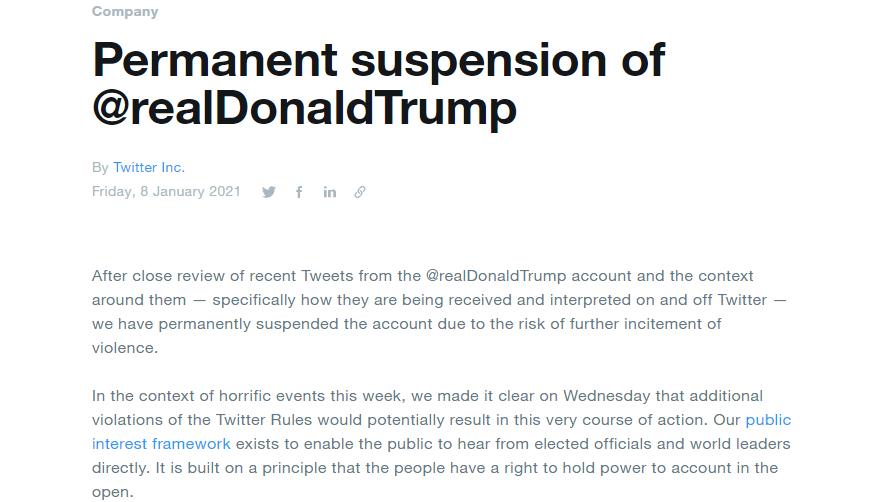By James ClaytonNorth America technology reporter
- Published
In 2016, fresh from his stunning presidential victory, Donald Trump sat down to be interviewed on the prestigious US news show 60 Minutes.
He was asked about his use of social media.
"I'm going to be very restrained, if I use it at all," he said.
That didn't quite work out. He used it continuously, racking up more than 20,000 tweets during his presidency.
Mr Trump's strategy was to dominate the news cycle. Twitter in particular helped him do that.
Journalists in newsrooms around the world waited for his first daily tweet to drop. "He's up," was the popular refrain. He was a news-making machine.
Mr Trump said his use of Twitter and other platforms was a way of bypassing traditional media - speaking directly to voters.
Just before the 2020 election he was asked, once again on CBS' 60 Minutes, whether his tweets were putting off voters:
"No, I think I wouldn't be here if I didn't have social media… and frankly if I didn't have social media I'd have no way of getting out my voice." he said.
Yet within three months, Mr Trump was to be spectacularly dumped from every single major social media network. Twitter, Facebook, Instagram, YouTube.

For someone who credits his political existence to social media this could have caused catastrophe.
And yet it hasn't.
In fact there is a school of thought that being off social media, at least for now, has actually helped him.
The broad theory is that Mr Trump, by staying relatively quiet, is following Napoleon's advice: Never interrupt your enemy when he is making a mistake.
On Sunday a Trump adviser told the Wall Street Journal: "I don't know a single person in Trump world who regrets that this has happened - not a single one."
That seems counter-intuitive, but it's not a fringe view. Darrell West, vice-president at the policy research group Brookings Governance, agrees.
"At a time when the pandemic has come back, the economy is slowing and there have been foreign policy disasters, you want public attention focused on the incumbent," he says.
"Biden's numbers have dropped considerably. So I think Trump has benefited from not being in the spotlight."
Opinion polls suggested that Mr Trump's at times erratic tweets were turning some conservatives off. Perhaps a break was needed.
Certainly his mentions on social media are way down - yet his grip over the Republican party is as tight as ever.
Make no mistake, though, Mr Trump wants his posting rights back.
Few would argue that a social media ban which stretched into 2024 would help a bid for the White House (if he decides to run).
His team might say he has benefited from some downtime, but ultimately they want their man un-muzzled. They are currently suing Facebook, Twitter and Google in an attempt to reverse their decisions.
In theory Mr Trump will be allowed back onto Facebook in a year's time, on 7 January 2023 to be exact.
Twitter has said that their suspension is permanent. However, there is some hope for Mr Trump here. He could of course win his court challenge, though legal experts think that is unlikely.
But there are other potential routes back to Twitter for Mr Trump. For one, Twitter has a new CEO. Jack Dorsey has been replaced by Parag Agrawal. The bad news for Mr Trump is so far Mr Agrawal has shown little sign of any change of direction - with Twitter banning Republican congresswoman Marjorie Taylor Greene last week.
Banning a president on his way out is one thing, though. If Trump were to become the Republican presidential nominee, West argues, there would be immense pressure to let him back on.
"If he becomes an announced candidate, I think there's a good chance he will be back," he says.
"American law traditionally allows wide latitude to candidates to say whatever they want, even if what they're saying is completely inaccurate and full of falsehoods."
Aides to Mr Trump says he'll launch his own social media platform - Truth Social - next month. No doubt it will attract high-profile Republicans and his supporters. But it's hard to see how it would challenge Twitter or Facebook.
Mr Trump may not like it, but if he wants revenge in 2024, he may well need some help from the people he despises, Big Tech bosses in Silicon Valley, to give him back his microphone.
James Clayton is the BBC's North America technology reporter based in San Francisco. Follow him on Twitter @jamesclayton5.




